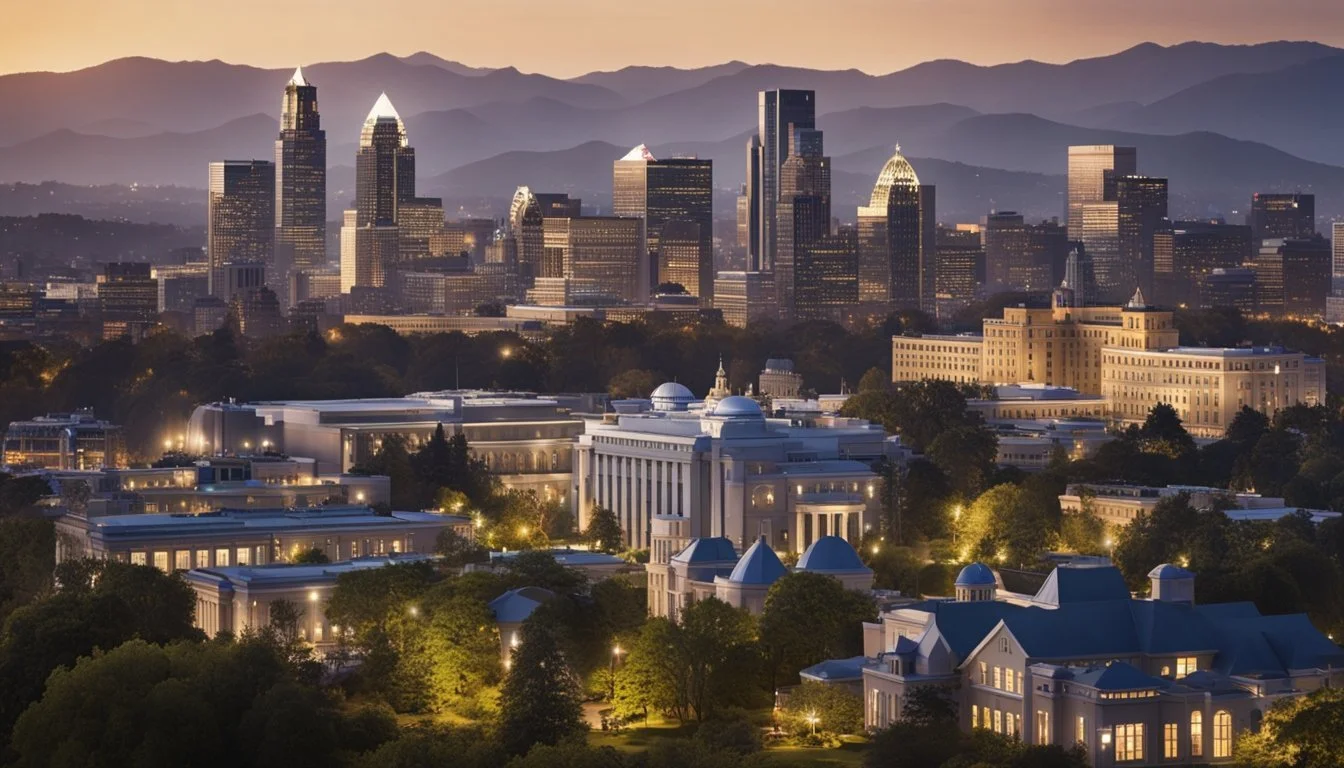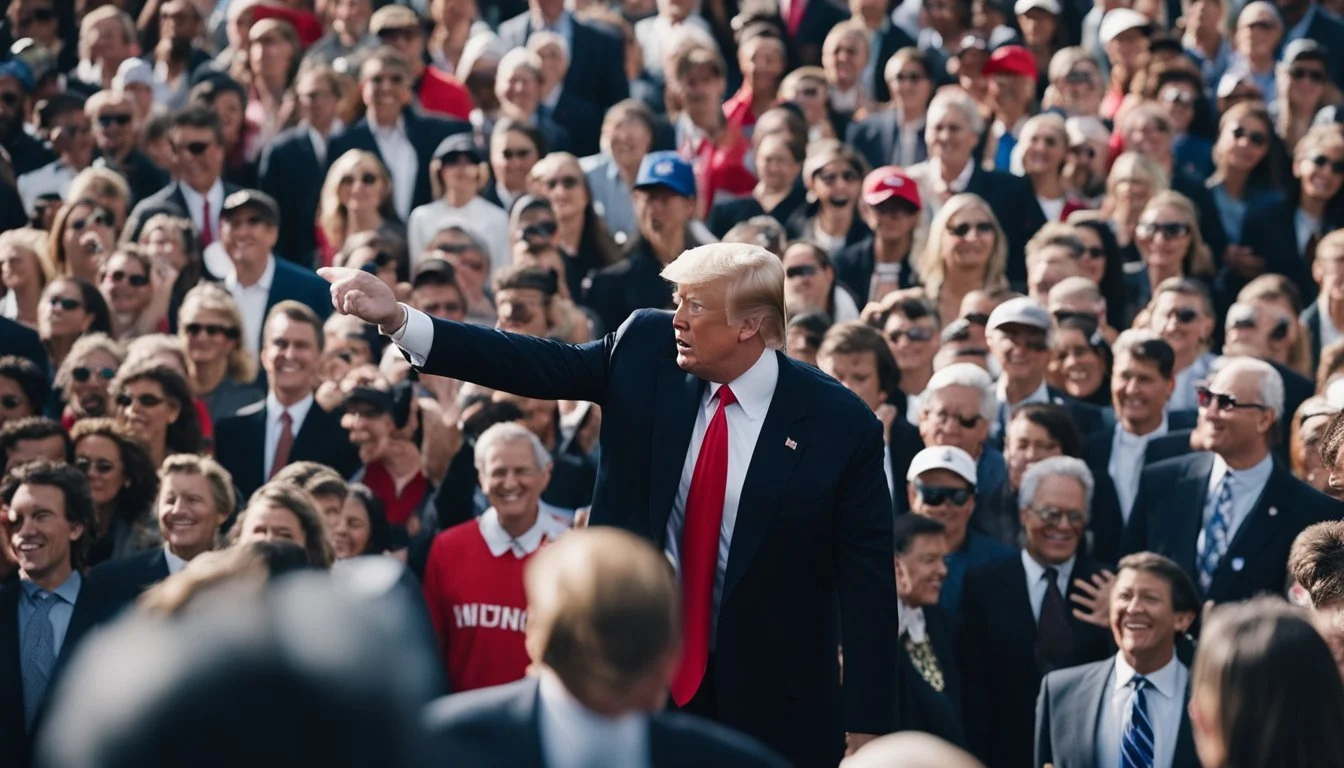The Academic Journey of Donald Trump
Proposed Reforms and Policy Impacts
Donald Trump's educational journey shaped his path to becoming a prominent businessman and later the 45th President of the United States. Trump earned a Bachelor of Science degree in Economics from the Wharton School of the University of Pennsylvania in 1968. This prestigious business school is known for its rigorous academic programs and highly regarded reputation in the business world.
Before attending Wharton, Trump spent two years at Fordham University in New York City. He then transferred to the University of Pennsylvania to complete his undergraduate studies. Trump's education at Wharton provided him with a foundation in economics and business principles that he would later apply in his real estate career and other business ventures.
Throughout his public life, Trump has often referenced his Wharton education as evidence of his intelligence and business acumen. While his time at the university was relatively unremarkable according to classmates, the degree from Wharton has remained a point of pride for Trump and a credential he frequently mentions when discussing his qualifications for leadership roles.
Early Life and Education
Donald Trump's formative years were shaped by his family background, private schooling, and higher education experiences. His journey from a wealthy New York family to prestigious educational institutions laid the groundwork for his future business and political career.
Birth and Family Background
Donald John Trump was born on June 14, 1946, in Queens, New York. He was the fourth of five children born to Fred Trump, a successful real estate developer, and Mary Anne MacLeod Trump, a Scottish immigrant.
The Trump family lived in a wealthy neighborhood in Jamaica Estates, Queens. Fred Trump's success in real estate provided a privileged upbringing for young Donald and his siblings.
Kew-Forest School
Trump began his education at the private Kew-Forest School in Forest Hills, Queens. He attended the school from kindergarten through seventh grade.
The school provided a rigorous academic environment for its students. However, Trump reportedly struggled with discipline issues during his time there.
New York Military Academy
At age 13, Trump's parents decided to send him to the New York Military Academy (NYMA) in Cornwall-on-Hudson, New York. This decision was made to instill discipline and focus in the young Trump.
At NYMA, Trump excelled both academically and athletically. He participated in various sports and held leadership positions, including captain of the baseball team and student leader in his senior year.
Trump graduated from NYMA in 1964.
College Education at Fordham University
After completing his studies at NYMA, Trump enrolled at Fordham University in the Bronx, New York. He attended Fordham for two years, from 1964 to 1966.
During his time at Fordham, Trump studied economics and participated in various extracurricular activities. However, he later decided to transfer to a different institution to complete his undergraduate degree.
Wharton School of Finance
In 1966, Trump transferred to the Wharton School of Finance at the University of Pennsylvania. This move was motivated by his desire to study at a more prestigious business school.
At Wharton, Trump focused on real estate studies, which aligned with his family's business interests. He graduated in 1968 with a Bachelor of Science degree in economics.
Trump's education at Wharton provided him with valuable business knowledge and connections that would later prove useful in his career as a real estate developer and entrepreneur.
Business Endeavors and Acumen
Donald Trump built a vast business empire spanning real estate, entertainment, and branding. His ventures experienced both notable successes and significant setbacks over the decades.
Career Beginnings and Real Estate Development
Trump joined his father's real estate company in 1968, renaming it The Trump Organization in 1971. He focused on Manhattan properties, acquiring and renovating the Commodore Hotel in 1976. This project became the Grand Hyatt, marking his first major success.
In 1983, Trump completed his signature Trump Tower on Fifth Avenue. The 58-story skyscraper featured luxury condominiums, offices, and shops. It became an iconic symbol of Trump's brand and ambition.
He expanded into casino development in Atlantic City during the 1980s. Trump acquired three casinos: Trump Plaza, Trump Castle, and Trump Taj Mahal.
Expansion into Entertainment and Media
Trump hosted the reality TV show "The Apprentice" from 2004 to 2015. The program significantly boosted his public profile and personal brand.
He purchased the Miss Universe pageant in 1996, which he owned until 2015. This venture expanded his presence in the entertainment industry.
Trump briefly operated an online travel booking site called GoTrump.com in 2006. The venture was short-lived and ceased operations after a year.
Branding and Licensing Deals
The Trump name became a valuable brand, licensed for use on various products and properties. Trump-branded items included furniture, clothing, and even steaks.
He licensed his name to numerous real estate developments worldwide. These projects often involved minimal financial investment from Trump himself.
The Trump Organization expanded into golf course ownership and management. By 2024, the company operated 19 golf properties across multiple countries.
Financial Challenges and Successes
Trump's businesses faced financial difficulties in the early 1990s. His Atlantic City casinos filed for bankruptcy multiple times between 1991 and 2009.
He rebounded through strategic debt restructuring and by shifting focus to licensing deals. These moves reduced his financial risk while maintaining brand visibility.
Forbes estimated Trump's net worth at $2.5 billion in 2023. This figure fluctuated significantly over the years, often sparking debate about the true value of his assets.
Political Journey
Donald Trump's political career transformed from business mogul to 45th President of the United States. His controversial tenure reshaped American politics and polarized the nation.
Presidential Campaigns
Trump announced his candidacy for the 2016 Republican nomination in June 2015. He defeated 16 other candidates in the primaries, securing the nomination. His campaign focused on immigration, trade, and "draining the swamp" in Washington.
In the general election, Trump faced Democrat Hillary Clinton. Despite losing the popular vote, he won the Electoral College with 304 votes to Clinton's 227. Key victories in swing states like Florida, Ohio, and Pennsylvania secured his victory.
Trump ran for re-election in 2020 against Democrat Joe Biden. The COVID-19 pandemic dominated the campaign. Biden won both the popular vote and Electoral College, but Trump disputed the results.
45th President of the United States
Trump took office on January 20, 2017. His administration pursued an "America First" agenda, focusing on domestic issues and reshaping international relationships.
He appointed three Supreme Court justices: Neil Gorsuch, Brett Kavanaugh, and Amy Coney Barrett. This shifted the court's ideological balance to a 6-3 conservative majority.
Trump's communication style broke presidential norms. He frequently used Twitter to announce policies, criticize opponents, and engage directly with supporters.
His presidency was marked by high staff turnover, with frequent changes in key positions like Chief of Staff and Secretary of State.
Policies and Achievements
Tax Cuts: Passed the Tax Cuts and Jobs Act of 2017, lowering corporate tax rates
Deregulation: Rolled back numerous environmental and business regulations
Immigration: Implemented travel bans and pushed for border wall construction
Trade: Renegotiated NAFTA into USMCA, engaged in trade disputes with China
Foreign Policy: Moved U.S. Embassy in Israel to Jerusalem, met with North Korean leader Kim Jong-un
Criminal Justice Reform: Signed the First Step Act, reforming federal prisons and sentencing laws
Trump's economic policies initially led to low unemployment and stock market gains. The COVID-19 pandemic later caused significant economic disruption.
Controversies and Impeachment
Trump faced numerous controversies throughout his presidency. The Mueller investigation examined Russian interference in the 2016 election and potential obstruction of justice.
He was impeached twice by the House of Representatives:
December 2019: Abuse of power and obstruction of Congress related to Ukraine
January 2021: Incitement of insurrection following the January 6 Capitol attack
The Senate acquitted Trump in both trials. He was the first president to be impeached twice and the only one impeached after leaving office.
Other controversies included:
Separation of migrant families at the southern border
Response to the Charlottesville rally
Handling of the COVID-19 pandemic
Attempts to overturn the 2020 election results
These issues deeply divided the American public and political landscape.
Publications and Media Presence
Donald Trump leveraged his business acumen and celebrity status to establish a strong media presence through books and television. His bestselling publications and reality TV appearances catapulted him into the national spotlight, shaping his public image long before entering politics.
The Art of the Deal and Other Books
Trump co-authored "The Art of the Deal" in 1987, which became a New York Times bestseller. The book detailed his business philosophy and deal-making strategies. It sold over a million copies and cemented Trump's reputation as a savvy businessman.
Trump went on to publish several other books, including:
"Trump: Surviving at the Top" (1990)
"The Art of the Comeback" (1997)
"Trump: The Art of the Deal" (2004)
"Trump: How to Get Rich" (2004)
These publications focused on Trump's business experiences and advice, further solidifying his brand as a successful entrepreneur and dealmaker.
Reality Television with The Apprentice
In 2004, Trump became the host of NBC's reality show "The Apprentice." The program featured contestants competing for a job in one of Trump's companies. His catchphrase "You're fired!" became iconic.
The show's success led to a spin-off, "The Celebrity Apprentice," in 2008. Trump hosted both series until 2015, significantly boosting his visibility and popularity among American audiences.
"The Apprentice" franchise:
Ran for 14 seasons
Averaged 20 million viewers in its first season
Earned Trump a reported $214 million over 11 years
The show helped Trump cultivate his image as a tough, decisive leader, which he later leveraged in his political career.
Personal Life
Donald Trump's personal life has been marked by multiple marriages, high-profile children, and a lavish lifestyle. His relationships and family have often been in the public eye due to his celebrity status and political career.
Marriages and Children
Trump has been married three times and has five children. His first marriage was to Ivana Zelníčková from 1977 to 1992, with whom he had three children: Donald Jr., Ivanka, and Eric. In 1993, he married actress Marla Maples, and they had one daughter, Tiffany, before divorcing in 1999.
Trump's current wife is Melania Knauss, whom he married in 2005. They have one son together, Barron, born in 2006. Melania, a former model from Slovenia, became the First Lady of the United States during Trump's presidency.
Lifestyle and Personal Interests
Trump is known for his luxurious lifestyle and opulent taste. He has resided in high-end properties, including Trump Tower in New York City and Mar-a-Lago in Florida. Golf is one of his primary interests, and he owns numerous golf courses worldwide.
Trump's diet has been a topic of public interest, with reports of his preference for fast food and well-done steaks. He is also known to abstain from alcohol and tobacco. His distinctive hairstyle and use of bronzer have become recognizable traits throughout his public life.
Legal and Financial Affairs
Donald Trump's business dealings and personal conduct have led to numerous legal challenges and investigations. His financial records and tax returns have faced intense scrutiny, while multiple criminal charges and civil suits have been brought against him.
Tax and Business Records
Trump's tax returns and business records became a major focus of investigations. The New York Times reported that he paid only $750 in federal income taxes in 2016 and 2017. His company, the Trump Organization, was convicted of tax fraud in 2022.
Trump fought to keep his financial records private. The Supreme Court ruled in 2020 that he had to turn over tax returns to New York prosecutors. Congress also sought access to his returns through legal battles.
Criminal Charges and Investigations
In 2023, Trump was indicted on 34 felony counts related to falsifying business records. This stemmed from alleged hush money payments to Stormy Daniels. He pleaded not guilty.
Other criminal investigations have looked into Trump's actions around the 2020 election and handling of classified documents. In Georgia, a grand jury investigated potential election interference.
Trump also faces civil lawsuits. E. Jean Carroll sued him for defamation and battery related to an alleged sexual assault in the 1990s. A jury found Trump liable and awarded Carroll $5 million in damages.
Cultural Impact and Legacy
Donald Trump's influence extends beyond politics, shaping business and cultural norms in the United States and globally. His presidency left a lasting imprint on American society and institutions.
Influence on Business Culture
Trump's business approach influenced corporate practices and entrepreneurial mindsets. His "Art of the Deal" philosophy promoted aggressive negotiation tactics and self-promotion. Many executives adopted Trump's brash communication style and prioritization of personal branding. His reality TV show "The Apprentice" popularized business-themed entertainment and shaped public perceptions of leadership.
Trump's real estate ventures in New York City and elsewhere set trends in luxury development and marketing. His licensing deals expanded the Trump brand into diverse industries. Critics argue this approach prioritized image over substance in business dealings.
Political Impact
Trump's presidency reshaped American political discourse and party dynamics. He leveraged social media, particularly Twitter, to communicate directly with supporters and critics alike. This approach bypassed traditional media and influenced how politicians engage with the public.
Trump's "America First" policies shifted Republican priorities on trade, immigration, and foreign relations. His appointment of conservative judges to federal courts and the Supreme Court will impact legal interpretations for decades. Trump's challenges to election integrity in 2020 affected public trust in democratic institutions.
His political style emboldened populist movements globally. Trump's presidency intensified political polarization in the United States, with lasting effects on civic discourse and partisan cooperation.





